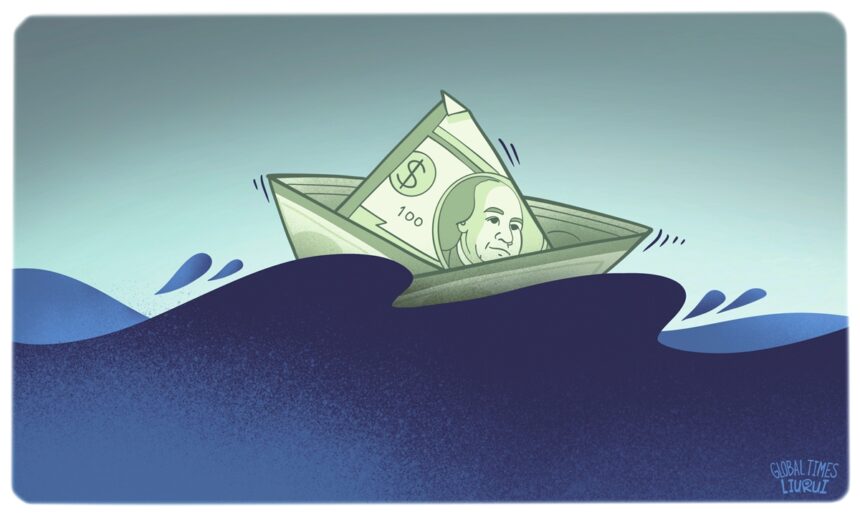By Hu Weijia
The recent fluctuations in South Korea’s currency serve as a reminder of the effects of US tariff policies on global financial stability. The latest example is a report by the Yonhap News Agency on Sunday, which attributed the volatility of South Korea’s won against the US dollar to factors including uncertainty surrounding Washington’s sweeping import tariffs.
In April, the average daily fluctuation in the won-dollar rate reached 9.7 won ($0.0071), the highest level of volatility since November 2022. This figure notably surpassed the March number, which stood at 4.3 won, according to the Yonhap News Agency.
In April, the US frequently wielded the tariff stick, a move that quickly had adverse effects on the financial markets. Bloomberg reported on April 8 that currency traders are positioning for turbulence in currency markets to get even worse as an escalating trade war shakes up the global economic order. The dollar and its peers have been whipsawed by some of the sharpest price swings since the 2008 financial crisis, as conflicting tariff messages from Washington keep markets on edge, according to Bloomberg.
Some indicators hint that we might see continued volatility in the currency markets for a while. According to Bloomberg, a sharp rise in both common and more remote option wagers shows that traders are preparing for bigger market swings to become the norm.
The tariff threats by Washington, ostensibly aimed at protecting domestic industries and correcting trade imbalances, have generated side effects and stoked financial instability. This means that tariffs are not merely an isolated issue affecting the economies directly involved in Washington’s tariff offensive but a global concern that brings greater uncertainty to financial markets.
In another word, even if an economy secures a tariff exemption from the US through painful compromises, it is not entirely immune to the side effects of US tariff policies. The ripple effects of Washington’s tariffs extend beyond the trade domain, influencing a broader financial spectrum, including currency valuations and investor confidence worldwide.
The recent fluctuations in the currency market serve as a poignant illustration of how interconnected and, by extension, how vulnerable our global financial system is to irresponsible unilateralism. It is a reminder that in an era of globalized economies, no nation is an island. Policies designed in isolation, without considering their global impact, can have far-reaching consequences that ultimately boomerang, affecting the US domestic economy and financial assets.
The erratic and haphazard approach of the US government’s trade policy is reportedly undermining global investors’ confidence in US dollar-denominated assets. The recent fluctuations in the US financial markets, including stocks, bonds and foreign exchange, to some extent, reflect investors “voting with their feet” on the US dollar and dollar-denominated assets.
Since the US government announced its tariff hikes, the US Dollar Index has been continuously fluctuating and declining, dropping about 10 percent from its peak at the beginning of this year. In an article published on April 16, JP Morgan noted that the dollar has faced widespread downward pressure since the introduction of US tariffs. The Wall Street Journal reported in April that a persistent weakening of the dollar is stoking fears that Washington’s erratic trade policy may have damaged the currency’s safe-haven status, with consequences for the US economy.
When US stocks and bonds decline together, investors get spooked about broader economic stability. The trend is so unusual it’s associated with moments of extraordinary uncertainty, like the pandemic and the 2008 financial crisis, CNN reported last month.
CNN’s Fear and Greed Index, a snapshot of emotion in the markets, has been registering “fear” or “extreme fear” for the last month, CNN reported on April 28, suggesting that the impacts of the US tariffs on its own economy could exceed some people’s original expectations.
These developments underscore the broad impact of US policies and the interconnectedness of global economies. The rising uncertainty in the financial markets as a result of US tariff policies is harming the American economy.
The financial side effects of US tariff policies cannot be ignored. It becomes increasingly clear that unilateral actions can have unintended consequences that ripple through the global economy, emphasizing the need for a spirit of multilateral and mutually beneficial cooperation to foster a more stable and prosperous global financial landscape.
The author is a reporter with the Global Times. bizopinion@globaltimes.com.cn











